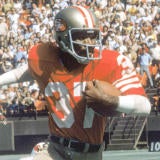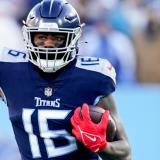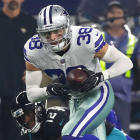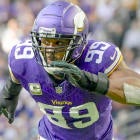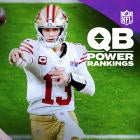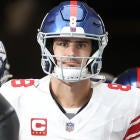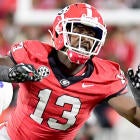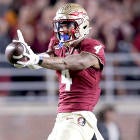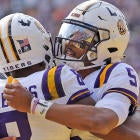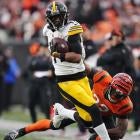Ever since then-Seattle Seahawks star Earl Thomas was spotted following Dallas Cowboys coach Jason Garrett toward the team's locker room and telling Garrett to "come get me" if Thomas were to ever become available, it was widely assumed the Cowboys would do just that.
Thomas was the subject of trade rumors last offseason, with the Cowboys the team most often connected to the talks. Discussions between the two teams reportedly broke down during the 2018 draft, and when the season rolled around, the Cowboys decided to just wait things out and try to get him after the year, upon the expiration of his contract and his foray into free agency. Thomas intercepted two passes against the Cowboys in the third game of the year, bowing toward the Dallas sideline to let them know he remembered that they would not pony up to acquire his services.
Even after Thomas broke his leg the following week and had to miss the rest of the season, it was widely assumed that the Cowboys would be the top suitor for Thomas when he hit the open market. Instead, they barely registered interest once they heard the asking price, and Thomas signed with the Baltimore Ravens for $55 million over four years.
And the Cowboys didn't just pass on Thomas. While seven different safeties received guarantees of at least $10 million and 13 starting safeties changed teams, Dallas' only signing at the position was George Iloka, whom they landed on a one-year, $1.02 million deal that contains just $300,000 in guaranteed money. They appear to have not been all that interested in Landon Collins or Tyrann Mathieu or Lamarcus Joyner or Adrian Amos or Tashaun Gipson or Eric Weddle or Morgan Burnett or any of the other various safeties who moved around the league.
Surely, the thinking went, the Cowboys were just planning to address the position in the draft. Safety was considered one of the deepest positions in this year's class, with potential starters available into the late second round -- where the Cowboys had their first pick of the draft, having traded away their first-rounder in the Amari Cooper swap. When Dallas came on the board at pick No. 58, just two safeties had been drafted. Players heavily rumored to be their target, like Juan Thornhill and Taylor Rapp, were still on the board, as was Nasir Adderley. Instead, the Cowboys picked defensive tackle Trysten Hill, and did not select a safety until the sixth round, where they landed Texas A&M's Donovan Wilson.
Save for a check-in on the health of the still-unsigned Eric Berry, the Cowboys have not shown any interest in bringing in another safety. Instead, it appears they'll head into the 2019 season with Xavier Woods and Jeff Heath as their starting safeties, with Iloka, Wilson, and Kavon Frazier working in behind them. In other words, they're going to roll with pretty much the same safety group as they've had for the past two years. And that's a curious decision, to say the least.
Woods is a respectable starting safety, and probably around a league-average player for his position. (His overall grade from Pro Football Focus last season was 70.5, which ranked 36th out of the 67 safeties who played at least 500 snaps.) Woods has experience playing outside corner, in the slot, and as both a free and strong safety, and that versatility serves the Cowboys well. Due to his size (5-11, 202 pounds), he is better in coverage -- especially in short zones -- than he is at coming up and playing the run, but he's a solid enough tackler to drop down into the box on occasion.
Woods has not yet turned into much of a playmaker at the NFL level, though, despite racking up 14 interceptions, 18 passes defensed, 20.5 tackles for loss, six forced fumbles, and three touchdowns in college. In his two seasons as a pro, Woods has just three picks, 12 passes defensed, one forced fumble, and one tackle for loss. Not being a playmaker is something a defense can live with from one of its safeties, so long as he is solid in his responsibilities and his safety partner produces takeaways and/or is similarly competent against both the run and pass.
The problem for the Cowboys is that Woods' safety partner is Jeff Heath.
The Cowboys have for some reason always had far more faith in Heath's ability to be a starting safety than anyone else in the league does, including most film-watchers and metrics-based analysts. Heath misses a ton of tackles -- 19 last season, second-most among the aforementioned 67 safeties who played at least 500 snaps. He's also not very reliable in coverage: his 77.6 percent catch rate allowed was seventh-worst among those same 67 safeties, and his 105.2 passer rating allowed ranked in the bottom third.
Heath has made the occasional splash play, like his interception of Aaron Rodgers late in the Cowboys' 2016 playoff loss to the Packers, but the bad far outweighs the good when he plays on the back end of the defense, and it has for a while. There's a reason there were nearly two years of speculation about the Cowboys splurging for a big-money replacement, and that nearly everyone around the league just assumed they'd be in the market for a new safety to partner with Woods this offseason, whether via free agency or trade.
But the Cowboys did not go in that direction. Rod Marinelli has been up front about the safety position not being nearly as important to his defense as the 3-technique tackle, which factored into the decision to draft Trysten Hill when Thornhill, Rapp, and Adderley were still on the board. But passing-game coordinator Kris Richard knows the importance of safeties when it comes to his style of secondary play. He turned Byron Jones into a star on the outside last year and got strong seasons out of Woods, Anthony Brown, and Chidobe Awuzie. It's likely he could unleash a top safety like he did Thomas and Kam Chancellor during his days in Seattle. The Cowboys just haven't given him one -- unless Frazier breaks out, Iloka takes to a new position, or Wilson turns into the same kind of steal Chancellor himself was.
Dallas has a strong overall roster. The Cowboys placed nine players on our staff top 100 list, most in the league. They have stars on offense and defense, at some of the most important positions in the league. Their biggest weakness is at a position that the team's defensive coordinator doesn't view as that important. We'll see if he's right.








